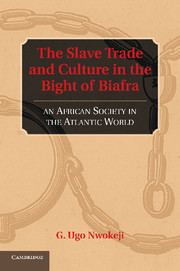Book contents
- Frontmatter
- Contents
- List of Tables and Figures
- Map of the Bight of Biafra and Its Hinterland
- Preface
- Foreword by Paul E. Lovejoy
- 1 Introduction
- 2 The Aro in the Atlantic Context: Expansion and Shifts, 1600s–1807
- 3 The Trade Diaspora in Regional Context: Aro Commercial Organization in the Era of Expansion, 1740–1850
- 4 Culture Formation in the Trading Frontier, c. 1740 to c. 1850
- 5 Household and Market Persons: Deportees and Society, c. 1740–c. 1850
- 6 The Slave Trade, Gender, and Culture
- 7 Cultural and Economic Aftershocks
- 8 Summary and Conclusions
- Notes on Sources
- Sources Cited
- Index
4 - Culture Formation in the Trading Frontier, c. 1740 to c. 1850
Published online by Cambridge University Press: 06 December 2010
- Frontmatter
- Contents
- List of Tables and Figures
- Map of the Bight of Biafra and Its Hinterland
- Preface
- Foreword by Paul E. Lovejoy
- 1 Introduction
- 2 The Aro in the Atlantic Context: Expansion and Shifts, 1600s–1807
- 3 The Trade Diaspora in Regional Context: Aro Commercial Organization in the Era of Expansion, 1740–1850
- 4 Culture Formation in the Trading Frontier, c. 1740 to c. 1850
- 5 Household and Market Persons: Deportees and Society, c. 1740–c. 1850
- 6 The Slave Trade, Gender, and Culture
- 7 Cultural and Economic Aftershocks
- 8 Summary and Conclusions
- Notes on Sources
- Sources Cited
- Index
Summary
The diasporic character of Aro expansion both facilitated the expansion of Bight of Biafra Atlantic trade, as described in Chapters 2 and 3, and defined the cultural context of Aro commercial and geopolitical expansion. Like other trade diasporas, Aro settlements outside the Arochukwu metropole were sites of cultural exchange. Of necessity, new cultural forms within a diasporic system reflect cultural influences from both the metropole and the natal homes of nonmetropolitan immigrant groups, as well as those of specific host societies. The Aro diaspora scattered throughout western Bight of Biafra reflects these ties, illustrating both how cultural practices shaped the slave trade and how the slave trade reconfigured the cultural landscape of the region.
The idea that the Aro commercial system within Igboland, where most of the settlements were located, was the successor to Nri cultural hegemony places the Aro in the broader context of Igbo cultural evolution. The establishment of Aro diaspora settlements in central Igboland from about 1740 onward promoted contact of unprecedented intensity between the Aro and the Nri “culture area.” Nevertheless, the evolving relationship between the Aro and Nri cultures was not a linear progression in which Aro culture replaced the Nri one. Rather, there was an active interaction between Nri and Aro cultural forms, on the one hand, and between these and cultural influences from local groups, on the other. Aro incursions into Igboland and elsewhere involved the “Igboization” of the Aro, and the “Aroization” of the non-Aro.
- Type
- Chapter
- Information
- The Slave Trade and Culture in the Bight of BiafraAn African Society in the Atlantic World, pp. 82 - 116Publisher: Cambridge University PressPrint publication year: 2010

